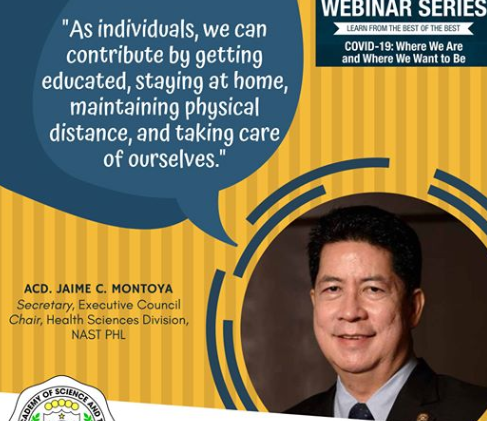March 30, 2020
Melody Mendoza Aguiba
A medical expert urged government and industries to adopt a COVID 19 testing system called “14-Day Test” that is totally free and yet has high degree of accuracy given a culture of trust among patients and healthcare professionals.
Dr. Antonio Miguel L. Dans, chief of University of the Philippines-Philippine General Hospital-Adult Medicine, said the COVID 19 14-Day Test may be adopted by companies or government offices with high accuracy given a “culture of trust” in its administration.
It is a simple medical history test, long recognized in medical education as a real test.
It is used in as simply as asking a person his last 14-day history—whether he felt sick or had cough and colds. This test goes on top of determining one’s temperature to check for fever.
At the National Kidney and Transplant Institute (NKTI), this test is done on all that enters hospital premises.
The NKTI 14 Day Test also includes asking all, no exceptions, whether one has travelled elsewhere in the last 14 days, whether he has been exposed to someone infected with COVID 19, and if he has diarrhea.
The only drawback to this test is if a person lies about his symptoms in the fear of circumstances. Maybe he may be asked not to go to work, therefore losing a salary, said Dans.
This is why Dans said money should be poured into for instance, assuring workers they will continue to receive salary despite absence for treatment.
“In pursuing 14 Day test, we need to build trust. We need to define relations between employer and employee, I think it’s where we should put our money in.” Dans said in a webinar of the National Academy of Science and Technology (NAST).

“We are spending P20 billion for tests. But this is also a test. This is a test that is taught in medical schools (over the time) they study medicine for 10 years,” said Dans. “If we don’t expect people to admit their symptoms then we will have to do lab tests everyday.”
Dans gave tips on how to encourage employee to employer trust in administering this test:
- Assure employees that admission of symptoms will be beneficial to potential patients and their families and communities
- Assure employees of sustained compensation in jobs
- Incentivize absenteeism when one already feels sick
- Assure employs of being supported with the proper treatment and financial aid through linkage with Philhealth
Definitely, even these tests, one should continue to practice social distancing and make ti a habit to observe regular washing of hands, use of disinfectants, and personal hygiene.
Dr. Jaime C. Montoya, executive director of the Philippine Council for Health Research and Development (PCHRD), also reported during the webinar updates on these (PCHRD)-supported projects related to the control of COVID 19:
- Bioactivity of lauric acid (virgin coconut oil) as adjunct therapy for COVID 19. This is carried out by Ateneo de Manila University. It is also being studied by Food and Nutrition Research Institute and University of the PhIlippines Manila.
- SANIPOD—tent-based sanitation booths with air showers to sanitize healthcare workers upon exit from Covid 19 patient wards
- AMPLIFIED – also called micro PCR (polymerase chain reaction), it is a device for testing Covid 19. It is more convenient to use than the regular PCR machine. It may be used at the point-of-care. Research on it is carried out by Ateneo Research Institute of Science and Engineering.
- Big data analytics for quarantine policies implemented by Philippine Council for Industry Energy Emerging Technology Research & Development (PCIEERD). There are also nanotechnology-enhanced sanitizers, 3D printed face shields, and mobile artificial intelligence-enabled thermal scanners being produced by PCIEERD.
- Repurposing of existing drugs, supplements, and other formulations
- Studies on COVID 19 behavior (transmission or spread)
- Diagnostics and kit validation
- Artificial intelligence/Information Communication Technology-driven models and prediction studies
The Philippines is part of the World Health Organization’s Solidarity Trials and is implemented by the country’s National Institutes of Health.
It involves studies on four repurposed antivirals—Remdesivir, Lopinvir, Interferon, and Chloroquine. The country has 174 enrolled patients in this trial.
While Philippines has limited capacity in developing a vaccine, Montoya said the country is collaborating with other countries to also enable Philippines to readily access the vaccines.
With its involvement in vaccines’ clinical trials, Philippines will automatically have the scientific data for approval of the Food and Drug Administration. It will speed up local commercialization of such vaccines.
Clinical trials may be a later stage of vaccine development. Yet it is already too late for Philippines to venture into the early stages in COVID 19 vaccine development. This as other countries already have basic research on vaccine development.
The collaborations in pre-clinical or clinical trials include those with China– SinoPharma-Wuhan Institute of Biological Products and Beijing Institute and another project with Chinese Academy of Science-Guangzhou Institute of Biomedicine and Health. The others are with Chinese-Taipei—Academia Sinica and Adimmune Corp.
Montoya and Dans urged citizens to examine reports regarding Covid 19 before accepting these as truth. Or many fake news will mislead people into believing for example a treatment for COVID 19 that is really useless or expensive.
Dans said websites like the http://www.uptodate.com and http://www.psmid.org run by the Philippine Society for Microbiology and Infectious Diseases should be the reference of those who want to inquire on the latest and reliable information regarding COVID 19.
“These days we should be more discerning. Think and read. There are news on Facebook saying ‘may na diskubre na test sa COVID19.’ Then you will find out they’re too expensive,” said Montoya.
Test of accuracy of a news may include the following:
- Reference to a reliable source of information of website
- Absence of monetary interest (such as to sell a drug or test) of the source of information
- Use of emotional words as persuasion tool. Melody Mendoza Aguiba

